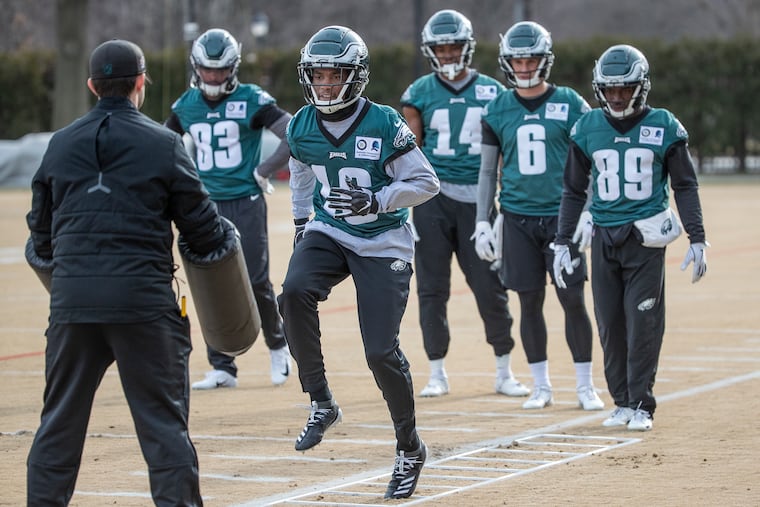How do Eagles get players like Greg Ward and Deontay Burnett up to speed so quickly?
The Eagles have been forced to remold their wide-receiving corps. How do they get guys off the street ready to play on short notice?

Every once in a while, between Carson Wentz breathlessly reciting a play call and his offensive teammates heading to their positions, Rob Davis will have a question.
He has worked frenetically the last few weeks to learn the Eagles’ entire playbook, but there are times he’ll still be tentative about his assignment. When doubt creeps in, he can sometimes ask Wentz, but he knows he can trust fellow receiver Greg Ward to help, too.
Given the circumstances, it shouldn’t be surprising. The Eagles have five healthy wide receivers ahead of their wild-card playoff game Sunday against the Seattle Seahawks. Among them, only J.J. Arcega-Whiteside was with the team for Week 1.
Davis and fellow practice-squad alumnus Deontay Burnett joined the Eagles in midseason, but both have been asked to fill in for the position group riddled with injuries.
Davis was signed to the practice squad in October and was promoted Dec. 12. The process of learning the entire playbook is daunting. Arcega-Whiteside spent most of training camp learning one spot in the offense, and it took him weeks to comprehend the offense from other positions.
Davis said the support group surrounding him has helped speed the process.
“It’s not easy, but you have a lot of help from the guys around you,” he said. “Even if it comes down to — you might be a little confused on something in the huddle and you might be like, ‘Carson, Carson,' and he’ll let you know. Or Greg because Greg’s been in the system for a long time, he knows the system just like a quarterback. I mean, he was a quarterback.”
The season-opener against Washington featured Alshon Jeffery, DeSean Jackson, Nelson Agholor, Mack Hollins, and Arcega-Whiteside on the 53-man roster. Jeffery and Jackson are both on injured reserve, Agholor is out with a knee injury, and Hollins was cut.
The average age of the wide receivers on that September afternoon was 27.4. The average age of the new group: 23.4.
When the Eagles lost Jeffery, Jackson, and tight end Dallas Goedert early in their Week 2 loss to the Atlanta Falcons, wide receivers coach Carson Walch called it one of the most hectic games he has coached. The offensive staff was drawing up plays on the sideline for players who hadn’t practiced at those positions.
In hindsight, it was good preparation for what the regular season would become, with extra time being required each week to get players such as Burnett and Davis ready for game day.
“[Walch] has been staying on me," Burnett said. "He’s been coaching me hard, as he should, and always keeping me in the loop of stuff on how things should be ran and just typical stuff coaches are going to coach you about, releases and bursting, stuff like that to try to help you get an advantage on game day.”
Burnett, 22, is the youngest of the bunch not only in age but also in time spent with the playbook. The wideout, who played last season with the New York Jets, was signed to the practice squad Dec. 12, when Davis was called up. Two weeks later, he was promoted.
His learning process has involved staying late after every position meeting, requiring Walch to stay with him. When he goes home, he studies for an hour, gives himself a mental break, and then studies for another hour to see how much of the information he’s able to retain.
“You just have to stay on top of it,” Burnett said. “It’s what we get paid to do, so it’s kind of like, ‘This is the job.’ You got to roll with it. That’s pretty much the way about it, just staying in the book.”
The Eagles’ backup quarterbacks play a role in getting the young receivers familiar, too. Josh McCown, who credited Walch for the extra time the coach has put in, said the biggest thing is one-on-one time with each player.
“It’s just extra meetings, extra walk-throughs, whatever it takes,” he said. "Myself, Nate Sudfeld — Nate Sudfeld’s been unbelievable — we kind of divide and conquer with taking these guys and be able to give them some one-on-one attention to kind of help them get ready.”
But the teammates and coaches don’t get all the credit. Offensive coordinator Mike Groh praised the former practice-squad players’ ability to fulfill the often overused “prepare like you’re a starter” promise that so many players make.
“One of the hardest things I think about being either a backup player or on the practice squad is staying focused,” Groh said.
“Concentrating, being diligent, not just when you go out to practice and you’re running the plays, but paying attention in the meetings. It would be really hard to try to catch up in a night’s notice when we say, ‘OK, you’re going to be called up.’ And they say, ‘Oh gosh, I wish I’d paid closer attention over the last three months.’ Those guys have been locked in.”